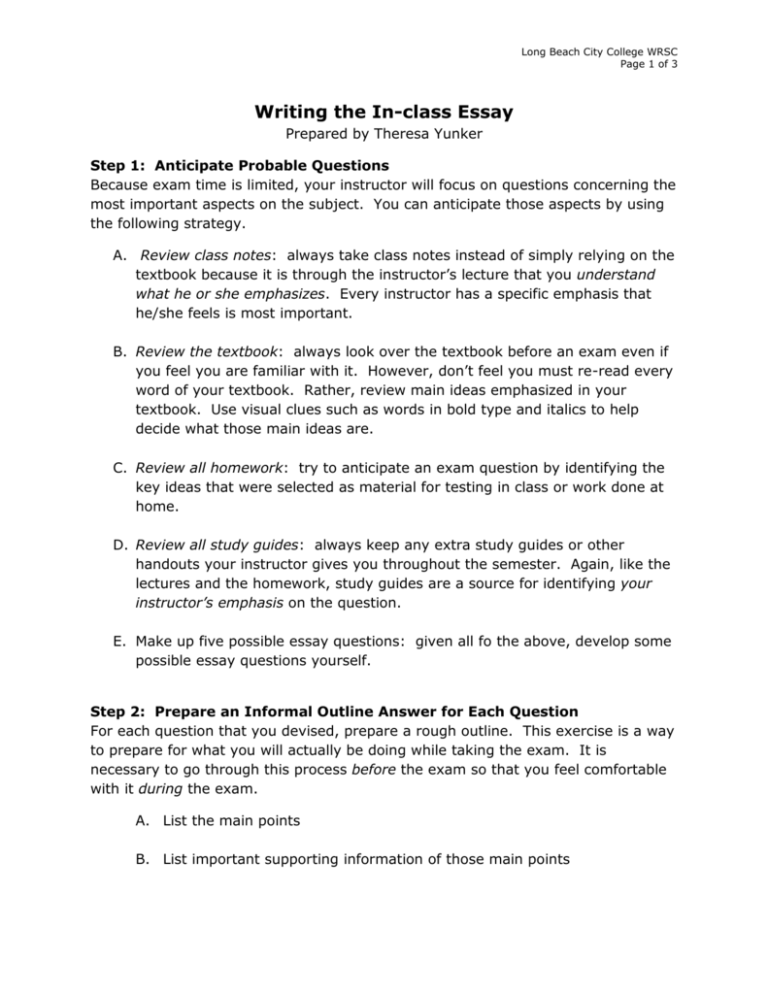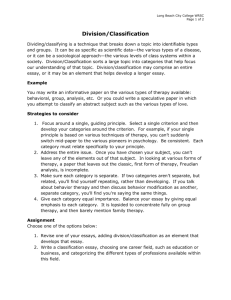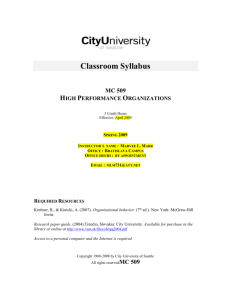Tips for Writing an In-Class Essay
advertisement

Long Beach City College WRSC Page 1 of 3 Writing the In-class Essay Prepared by Theresa Yunker Step 1: Anticipate Probable Questions Because exam time is limited, your instructor will focus on questions concerning the most important aspects on the subject. You can anticipate those aspects by using the following strategy. A. Review class notes: always take class notes instead of simply relying on the textbook because it is through the instructor’s lecture that you understand what he or she emphasizes. Every instructor has a specific emphasis that he/she feels is most important. B. Review the textbook: always look over the textbook before an exam even if you feel you are familiar with it. However, don’t feel you must re-read every word of your textbook. Rather, review main ideas emphasized in your textbook. Use visual clues such as words in bold type and italics to help decide what those main ideas are. C. Review all homework: try to anticipate an exam question by identifying the key ideas that were selected as material for testing in class or work done at home. D. Review all study guides: always keep any extra study guides or other handouts your instructor gives you throughout the semester. Again, like the lectures and the homework, study guides are a source for identifying your instructor’s emphasis on the question. E. Make up five possible essay questions: given all fo the above, develop some possible essay questions yourself. Step 2: Prepare an Informal Outline Answer for Each Question For each question that you devised, prepare a rough outline. This exercise is a way to prepare for what you will actually be doing while taking the exam. It is necessary to go through this process before the exam so that you feel comfortable with it during the exam. A. List the main points B. List important supporting information of those main points Long Beach City College WRSC Page 2 of 3 C. List examples/illustrations that can develop your support Step 3: Read Exam Questions Carefully Although this may seem obvious, many students make the error of only briefly scanning the question, thus missing or only vaguely noticing key ideas in the question. In addition, you can run into the mistake of answering one of your questions, rather than answering specifically the question on the exam. A. Take the time to understand all test directions fully B. Note direction in the wording of the essay question C. Budget your time Step 4: Prepare a Brief Outline Following the same format as Step 2, take the time to formulate an outline response before writing. This time is well spent because you can’t afford to write a disorganized, unclear essay. Writing a clear, well-organized essay, even if it is shorter than what you can produce at home, is more important. Length is not so important as answering the question in a clear and organized fashion. A. List the main points B. List important supporting information of those main points C. List examples/illustrations that can develop your support D. Number the main points in the order you will present them If you don’t have time for a formal outline, you need only list a word or phrase for each idea; then number the ideas in the order you will write them. Step 5: Writing the Essay Now you have done all the preliminary work. Begin! A. Remain calm B. Do not allow yourself to be distracted by other students C. Follow your outline and budget time as you write Long Beach City College WRSC Page 3 of 3 D. Be aware as you write of basic essay structure: Introduction, Supporting Points, and Conclusion E. If time allows, read over your essay and edit SAMPLE EXERCISE: Essay question Discuss why you have made the decision to attend college. Illustrate specific reasons for your decision. Finally, summarize the importance of college as a whole.









